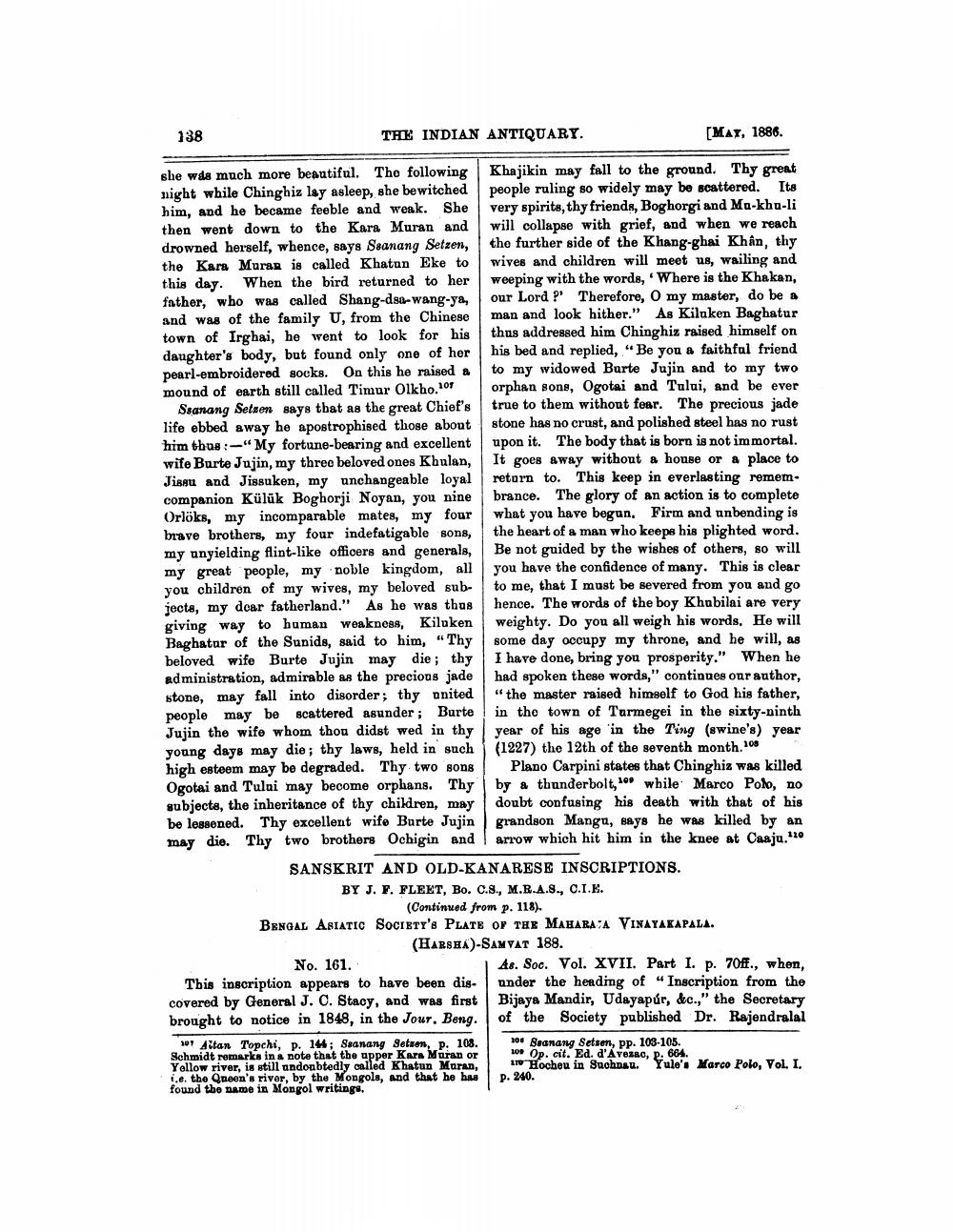________________
138
THE INDIAN ANTIQUARY.
she was much more beautiful. The following night while Chinghiz lay asleep, she bewitched him, and he became feeble and weak. She then went down to the Kara Muran and drowned herself, whence, says Seanang Setzen, the Kara Muran is called Khatun Eke to this day. When the bird returned to her father, who was called Shang-dsa-wang-ya, and was of the family U, from the Chinese town of Irghai, he went to look for his daughter's body, but found only one of her pearl-embroidered socks. On this he raised a mound of earth still called Timur Olkho.107
Ssanang Setzen says that as the great Chief's life ebbed away he apostrophised those about him thus:-"My fortune-bearing and excellent wife Burte Jujin, my three beloved ones Khulan, Jissu and Jissuken, my unchangeable loyal companion Külük Boghorji Noyan, you nine Orlöks, my incomparable mates, my four brave brothers, my four indefatigable sons, my unyielding flint-like officers and generals, my great people, my noble kingdom, all you children of my wives, my beloved subjects, my dear fatherland." As he was thus giving way to human weakness, Kiluken Baghatur of the Sunids, said to him, "Thy beloved wife Burte Jujin may die; thy administration, admirable as the precious jade stone, may fall into disorder; thy united people may be scattered asunder; Burte Jujin the wife whom thou didst wed in thy young days may die; thy laws, held in such high esteem may be degraded. Thy two sons Ogotai and Tului may become orphans. Thy subjects, the inheritance of thy children, may be lessened. Thy excellent wife Burte Jujin may die. Thy two brothers Ochigin and
No. 161.
This inscription appears to have been discovered by General J. C. Stacy, and was first brought to notice in 1848, in the Jour. Beng.
[MAY, 1886.
Khajikin may fall to the ground. Thy great people ruling so widely may be scattered. Its very spirits, thy friends, Boghorgi and Mu-khu-li will collapse with grief, and when we reach the further side of the Khang-ghai Khân, thy wives and children will meet us, wailing and weeping with the words, 'Where is the Khakan, our Lord ? Therefore, O my master, do be a man and look hither." As Kiluken Baghatur thus addressed him Chinghiz raised himself on his bed and replied, "Be you a faithful friend to my widowed Burte Jujin and to my two orphan sons, Ogotai and Tului, and be ever true to them without fear. The precious jade stone has no crust, and polished steel has no rust upon it. The body that is born is not immortal. It goes away without a house or a place to return to. This keep in everlasting remembrance. The glory of an action is to complete what you have begun. Firm and unbending is the heart of a man who keeps his plighted word. Be not guided by the wishes of others, so will you have the confidence of many. This is clear to me, that I must be severed from you and go hence. The words of the boy Khubilai are very weighty. Do you all weigh his words. He will some day occupy my throne, and he will, as I have done, bring you prosperity." When he had spoken these words," continues our author, "the master raised himself to God his father, in the town of Turmegei in the sixty-ninth year of his age in the Ting (swine's) year (1227) the 12th of the seventh month. 108
SANSKRIT AND OLD-KANARESE INSCRIPTIONS. BY J. F. FLEET, Bo. C.S., M.R.A.S., C.I.E. (Continued from p. 118).
BENGAL ASIATIC SOCIETY'S PLATE OF THE MAHARA A VINAYAKAPALA. (HARSHA)-SAMVAT 188.
107 Aitan Topchi, p. 144; Ssanang Setzen, p. 108. Schmidt remarks in a note that the upper Kara Muran or Yellow river, is still undoubtedly called Khatun Muran, i.e. the Queen's river, by the Mongols, and that he has found the name in Mongol writings.
Plano Carpini states that Chinghiz was killed 109 while Marco Polo, no by a thunderbolt," doubt confusing his death with that of his grandson Mangu, says he was killed by an arrow which hit him in the knee at Caaju.110
As. Soc. Vol. XVII. Part I. p. 70ff., when, under the heading of "Inscription from the Bijaya Mandir, Udayapur, &c.," the Secretary of the Society published Dr. Rajendralal
10 Seanang Setzen, pp. 103-105.
10 Op. cit. Ed. d'Avezac, p. 664.
Are Hocheu in Suchnau. Yule's Marco Polo, Vol. I. P. 240.




